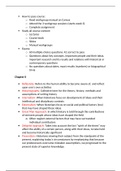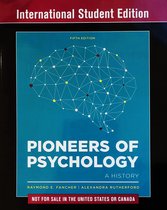How to pass course:
o Read workgroup manual on Canvas
o Attend the 3 workgroup sessions (starts week 3)
o Complete assignment
Study all course content:
o Lectures
o Course book
o Slides
o Manual workgroups
Exams:
o 60 multiple-choice questions: 42 correct to pass
o Questions about key concepts, important people and their ideas,
important research and its results and relations with historical or
contemporary questions
o No questions about dates, exact results (numbers) or biographical
trivia
Chapter 0
Reflexivity: Refers to the human ability to become aware of, and reflect
upon one’s own activities
Historiography: Collective term for the theory, history, methods and
assumptions of writing history
Internalism: When historians focus on development of ideas and their
intellectual and disciplinary contexts
Externalism: When historians focus on social and political factors (too)
that may have shaped these ideas
Great Man Approach: In which history is told through the contributions
of eminent people whose ideas have shaped the field
o Often neglect external factors that may have surrounded
individual contributors
Zeitgeist Approach: Takes into account the fact “spirit of the times” may
affect the ability of a certain person, along with their ideas, to take hold
and become historically significant
Presentism: Historians viewing their subject from the standpoint of the
present, explaining today’s circumstances by emphasizing that because
our predecessors overcame mistaken assumptions, we progressed to the
present state of superior knowledge.
, Historicism: Attempts to recreate the past as it was actually experienced
by predecessors, without distortion by foreknowledge of how things
later worked out
Sophisticated presentism: Historians arguing you can never escape the
horizon of the present when writing history and that historical study is
motivated by a desire to better understand contemporary issues.
New history of psychology / critical history of psychology: Moving
beyond ceremonial and celebratory aims, in which the history of
psychology is recounted as a progressive series of great
accomplishments
Origin myth process: Here history is written in a way to make it appear
as though psychology has progressed triumphantly from one great
discovery to the next, with little sense of complexity, messiness and
controversy that might have occurred along the way
Continuity-discontinuity debate: Disagreements over the start of history
of psychology
Indigenization: The process whereby local or national contexts affect the
development of psychology, including how ideas from elsewhere are
imported and changed in response to local conditions
Chapter 1
Foundational Ideas from Antiquity
Psyche: breath, animate, soul, what is present in a living entity and
absent in a dead entity
Hippocrates: observation, mechanistic explanation of disease (humoral
theory)
Socrates:
o Where does knowledge come from?
o Philosophical nativism
o Dialogue Meno: Knowledge lies within the psyche
o Insight: Mind contains capacities for interpretation that go
further than passive experience of the stimulus
o Rationalism
Plato:
o What is innate? (inborn, natural)
o How do we get knowledge?






